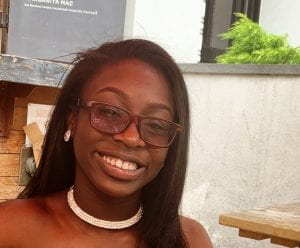
About the Author
Priscilla Agyen is a sophomore in Currier house originally from Brooklyn, NY. She has a joint concentration in African and African American Studies and Government. She is involved in Harvard’s African Student Association, and Harvard Partners for Action in Africa.
Beyond the Accent:
A Virtual Wintership in Chile
I applied to the DRCLAS Winternship for two main reasons. I wanted to have an international experience (albeit it would be remote) and number two because I really wanted to gain fluency in Spanish. I have been studying Spanish for a couple of years now I really wanted to gain proficiency beyond the classroom.
As a non-native Spanish speaker I was a little apprehensive about being able to communicate effectively in Spanish, but I wasn’t too worried about it. When I found out that I was placed with Tu Clase,Tu Pais in Chile, I was really excited. I am very passionate about themes related to education and Tu clase is a professional development company that provides professional development training to educators in Chile and other parts of Latin America.

Photo by Loïc Mermilliod on Unsplash
DRCLAS had been a great source of support for me throughout the entire process of my internship. Even before I began my internship with Tu Clase, the DRCLAS team had prepared a folder of resources for each country that students were interning in. To prepare for my internship I went through the folder and watched interviews and videos related to Chile and Chilean life. I also got in contact with my Spanish 40 teacher to get more resources on podcasts and other resources to familiarize myself with Chile and most importantly with the Chilean accent. Even with all the resources and the videos I don’t think I was truly prepared for the Chilean accent (Funny enough, after I had completed my final presentation for the Tu Clase team and I was relaying to the team members my initial difficulty with understanding the Spanish, one of the team members commented that I had it especially difficult because Chilean Spanish is like another language separate from Spanish).
I remember distinctly my induction meeting with the rest of the team where they were discussing their training model for online learning. I was completely flustered. They were using vocabulary in Spanish that I had not been familiar with like retroalimentación, competencías, desempeño among others, and every time the presenter said a couple of sentences she would end with an open ended word that sounded something like ¿cachai? (Catch – Eye). On top of that the speaker was speaking very fast so it was hard to follow at points so I had to rely a lot on the visual aid to understand. The whole time I remember feeling very nervous because I didn’t want them to mistake my silence for lack of interest. My DRCLAS mentor Pilo Mella had advised us in one of our sessions to interrupt and ask questions to show that we were engaged. At the end though I realized my nervousness was il guided as the team members were super kind and understanding.
My mentor for the program was the Director of Innovation and Development, although I also worked with other team members. I spent my first week reviewing documents to familiarize myself with the company’s training model and goals, including reviewing qualitative data in regards to their past implementations, looking at outlines of their goals and benchmarks, and reviewing definitions for keywords that they used a lot in outlining the framework for their training like competencia.
I think this is where I picked up a lot of my new vocabulary because I was reviewing more than a hundred pages of information. From reviewing the documents I realized that this company was extremely organized and professional (which is something that would be confirmed later by stakeholders when I interviewed them). It had documentation for it seemed like everything. I had to take copious notes to keep up! In addition to reviewing documents I also had the opportunity to attend various workshops with the team. A renowned educational specialist in Chile came in one time to give a talk, in addition to various other company development workshops in which the entire Tu Clase team came together to evaluate its progress and set goals. I definitely learned a lot from th professionalism and organization of the company and its team. It is something that I will definitely take with me when working with or possibly even starting my own organization in the future.
Since the time span of my internship was so short, we really had to narrow down my duties. I mentioned to them that I noticed that they seemed to serve a diverse range of clientele and that could be possibly greatly affecting the passing rates for their courses so they put me in charge of gathering data to help them in creating a comprehensive user profile for their clients. To do this I had to create a comprehensive survey that collected data about the stakeholder as well as the stakeholder’s apprentices. After that I used it to carry out interviews with the stakeholders. It was a very cool experience. I interviewed people from various sectors like banking, tourism, and I even interviewed someone from an institute for deaf people! It was so cool getting to hear about different sectors of work in Chile and in general just getting to talk to other Chilean people outside of the team. After the interviews I presented my findings to the rest of the members of my mentor’s team and followed up with a written report. I am so grateful that I was able to have this experience and I feel that Spanish has improved greatly because of it. It was definitely challenging for me at times but the amazing support from the team of Tu Clase and DRCLAS got me through it. I hope my experience with Tu Clase is just the beginning of my journey in improving my Spanish and working in Latin America.
More Student Views
Public Universities in Peru
Visits to two public universities in Peru over the last two summers helped deepen my understanding of the system and explore some ideas for my own research. The first summer, I began visiting the National University of San Marcos (UNMSM) to learn about historical admissions processes and search for lists of applicants and admitted students. I wanted to identify those students and follow their educational, professional and political trajectories at one of the country’s most important universities. In the summer of 2025, I once again visited UNMSM in Lima and traveled to Cusco to visit the National University of San Antonio Abad del Cusco (UNSAAC). This time, I conducted interviews with professors and student representatives to learn about their experiences and perspectives on higher-education policies such as faculty salary reforms and the processes for the hiring and promotion of professors.
Post-Secondary Education Access in Peru
Over the summer, I visited four public schools in Peru located in two regions, about 1,200 miles apart from each other. I interviewed teachers, principals and high school juniors and seniors. I wanted to discover their perspectives on perceived opportunities and barriers for students to plan for and fulfill their higher education goals. I also interviewed the superintendent at each school district to learn about local initiatives aimed at decreasing barriers to higher education transition.
The Opacity of Cuba’s La Habana Vieja
On a recent trip to Havana, two fellow visitors reminded me what it feels like to encounter the Cuban city for the first time and to become enamored with its paradoxes. The first, a young Kansan woman in my Airbnb, learning that I study Cuban architecture and urbanism, expressed a familiar curiosity about the dramatic contrast between austere 19th century mansions, colonial palaces and the surrounding blocks of ruinous buildings. The second, a Berliner, shared ceviche with me on a restaurant balcony overlooking a street bustling with tourists and art vendors. He pointed out with a laugh that our utensils came from Air France first class.




